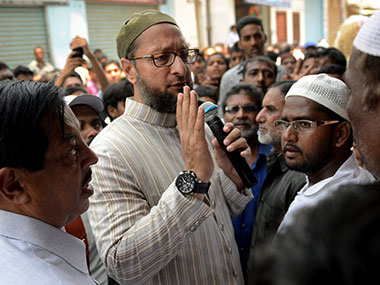Politics of identity has come home to roost in West Bengal. The
war of words between Mamata Banerjee and Asaduddin Owaisi is indicative of the squeezing space for so-called “secular parties” that have long carried out identity politics under the garb of “secularism”. The secular tradition of India was always far removed from the European concept of separating politics and religion. In India, at least under Jawaharlal Nehru, “secularism” was an ‘inclusive’ concept that was based rather loosely on India’s composite civilisational culture. Even though Nehru claimed that secularism in India means that “it is a state which honors all faiths equally and gives them equal opportunities,” in reality, the Indian State under Nehru sought to interfere in religious affairs of communities, and often that interference has not been equal. For instance, while Hindu temple traditions such as animal sacrifice was banned and entry of Dalits facilitated, the Nehru government implemented reformation of Hindu personal laws and brought the Hindus within an updated legal code while the Muslims were allowed to maintain their ‘sharia’ laws. [caption id=“attachment_5182761” align=“alignleft” width=“380”] Owaisi’s AIMIM, that openly practices identity politics without the coating of “secularism”, has manifestly added to Mamata’s problems. AFP[/caption] This unequal treatment was perhaps Nehru’s response to the Partition given the fact that India’s first prime minister, according to scholars such as Christophe Jaffrelot, suffered from a mistrust of Hindu nationalism, and sought to allay the fears of Muslims who had opted to remain in India, but this differing approach to different religious communities ultimately resulted in fatal subversion of the word “secularism” that Nehru or BR Ambedkar had perceived to be the cornerstone of an independent nation-state. As Jafferlot writes in his piece titled
The Fate of Secularism in India, “starting in the 1980s, Indian secularism came under more severe strain. The Congress Party began opportunistically pandering to one religious community after another more overtly, and Indian secularism was deeply damaged as a result.” Indira Gandhi’s cynical identity politics gave birth to All India Muslim Personal Law Board — a coterie of orthodox Muslim clerics and busybodies who claim to represent the entire Muslim community. She also made Aligarh Muslim University a minority institution. Her son Rajiv Gandhi’s infamous move to reverse the Supreme Court decision in Shah Bano case altered the course of India’s political trajectory forever by paving the way for BJP’s rise. The political model that the Congress and its regional clones and splinter groups perfected consisted of pandering to minority identity politics under the fake façade of secularism. This pseudo-secularism is pitted against BJP’s politics of Hindutva that till date remains largely misunderstood as a concept among theorists and commentators. It has been variously branded as Hindu revivalism, pro-Hindu cultural chauvinism, majoritarianism or communalism but its mooring as a civilisational concept and dharma that is inherently inclusive, secular and pluralistic has been largely ignored or misread in mainstream political discourse. Be that as it may, the squeezing of space for pseudo-secularism and the erosion of power suffered by parties who practice that model — Congress, TMC, RJD, etc., — has coincided with BJP’s rise. The equation has changed so dramatically post 2014 that parties such as Congress, faced with crippling electoral defeats and destruction of mass base have increasingly veered towards a model that has been called “soft Hindutva” in political discourse. It is in this context that we must place the predicaments of West Bengal chief minister Mamata Banerjee whose party is facing a bitter battle against the BJP in her state. Owaisi’s All India Majlis-e-Ittehadul Muslimeen (AIMIM) that openly practices identity politics without the coating of “secularism” has manifestly added to Mamata’s problems. When identity politics comes out into the open, the garb of fake secularism slips away. It is bad enough that BJP won 18 seats in West Bengal during the Lok Sabha elections and the ruling party’s tally was slashed to 22. This was without the presence of AIMIM in the state. Now, if Owaisi comes calling, plays the spoiler and puts a finger in Mamata’s Muslim vote bank pie, then the chances of BJP unseating her in all important 2021 Assembly polls become higher. This desperation to stop her minority vote bank from getting split has caused Mamata to see red. AIMIM’s upward trajectory — the party recently won Assembly seats in Bihar and Maharashtra that catapulted it as a player in national politics beyond the geography of Hyderabad — has made Owaisi more confident. He sees in West Bengal — a border state with high concentration of Muslim population estimated at around 30 percent- fertile ground for AIMIM’s rise. As a report in
The Telegraph notes, “The AIMIM’s posters with Owaisi’s pictures have been seen in some minority-dominated pockets of Bengal, with the declaration: “Intezaar ab khatam (The wait is now over), Mission West Bengal”. This has elevated Mamata’s blood pressure and caused her to throw barbs at Owaisi. Without naming him or the party, Mamata seemed to suggest at a rally in Cooch Behar on Monday that a party from Hyderabad takes “money from BJP” and indulges in religious extremism, while requesting Muslim community members “not to fall in their trap”. Mamata’s reaction is understandable but as a shrewd politician she should know that her one comment has given AIMIM more toehold than the party could have otherwise mustered. Owaisi might be criticising Mamata before the camera, but privately he won’t be complaining.
Politics of identity has come home to roost in West Bengal. The war of words between Mamata Banerjee and Asaduddin Owaisi is indicative of the squeezing space for so-called ‘secular parties’ that have long carried out identity politics under the garb of ‘secularism’.
Advertisement
End of Article


)
)
)
)
)
)
)
)
)



